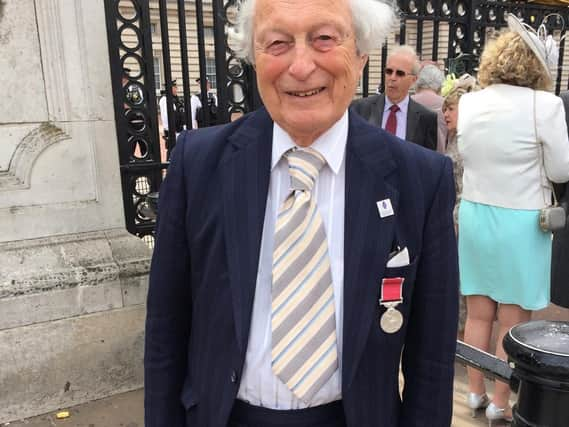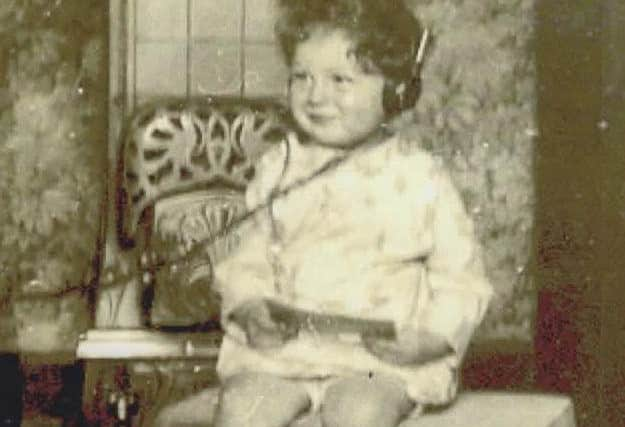Holocaust Memorial Day: The story of a Bradford Jewish community leader who fled from Berlin before WWII


Rudi Leavor BEM (British Empire Medal), aged 94, said it was important to have a specific day to commemorate the lives of at least six millions Jews who died at the hands of “unspeakable evil”.
Leeds Council is holding a special online event today (Wednesday) to mark one of the most tragic events in history - and it will include a memorial prayer, a film and poetry.
Advertisement
Hide AdAdvertisement
Hide AdThis year’s theme globally is “be the light in the darkness” and Rudi says the virtual memorials have an opportunity to reach a far wider audience.


Rudi will sing a traditional Hebrew memorial prayer to bring the event to a close - where people will be invited to light a candle at home.
Rudi moved to Bradford in West Yorkshire as a refugee in 1937 after his father secured a visa to become a dentist when he began to fear Jewish persecution in Germany.
Rudi recalled how his father had been arrested by the Gestapo, the official secret police of Nazi Germany, which was the final impetus for him to seek refuge in the UK.
Advertisement
Hide AdAdvertisement
Hide AdHe said that Holocaust Memorial Day is a “fiercely emotional” day for him each year, but that it was “fiercely important” to remember those who died.
He said: “During the Holocaust many people of different religions and ways of life were killed. Mainly Jews. It is said six million perished.
“It is the anniversary of the liberation of the worst of the concentration camps, Auschwitz, where at least a million and a half were killed in the most cruel ways.
“I myself have lost relatives. It’s important to remember them every day but to also pinpoint one day in the year where we concentrate hard on the lives these people lived and eventually died for.
Advertisement
Hide AdAdvertisement
Hide Ad“It concentrates the mind - there should be one day where all of our thoughts are concentrated on those dreadful memories in case someone forgets about them.
“It is a fiercely emotional day for me every year, but it’s fiercely important that we commemorate those who lost their lives and never forget them.
“I think the virtual memorial will be an opportunity to reach more people, especially young people.
“The day will certainly be filled with sadness from the huge and unnecessary loss of life. These people weren’t criminals. They were killed because of their beliefs.
“It’s a terrible way to die.
Advertisement
Hide AdAdvertisement
Hide Ad“When I wake up in the morning their lives will be all I think about.”
Rudi was born in Berlin on May 31, 1926.
He fled the capital city at aged 11 in 1937 after his father became increasingly worried about his family’s livelihoods in Germany during the rise of Hitler’s regime.
His father secured a visa working as a dentist and was told to pick a place in England aside from London and Manchester - which were too overcrowded with Jewish refugees by that time.
They ended up in Bradford where Rudi lived his entire life and went on to become a dentist himself.
Advertisement
Hide AdAdvertisement
Hide AdIn 1975 he became President and Chairman of the Bradford Reform Synagogue and in 2017 he was awarded the British Empire Medal for his work with the local Jewish Community and in interfaith and community relations.
He met his late wife Marianne, who was also a Jewish refugee from Breslau, in Bradford and had four children, eight grandchildren, and two great grandchildren.
He recalls the dramatic and confusing scenes as his father whispered in his ears that they were to leave Germany.
He said they were “good Germans” but also “good Jews” but had to leave family and friends behind - many of whom didn’t survive.
Advertisement
Hide AdAdvertisement
Hide AdWidowed Rudi said: “My parents, my sister and myself were fully integrated into German society. We were good Germans, but also good Jews.
“We could feel antisemitism coming up, it wasn’t a fierce event or situation. My parents hadn’t thought of emigrating.
“One day they were arrested by the Gestapo, fortunately for just one day. It gave them the impetus to emigrate.
“I remember the day we left Berlin, my hometown. We were assembled with my grandmother, and her sisters for a coffee.
Advertisement
Hide AdAdvertisement
Hide Ad“I thought of how we were going to leave many relatives, including my grandmother, my uncles, aunts, who it was likely we’d never see again.”
Rudi said that he had no idea of the existence of the concentration camps and that when news finally reached British shores - it felt “too unbelievable to be true”.
He recalls how BBC’s Richard Dimbleby reports at Bergen-Belsen concentration camp were “so gross, so vicious” that they seemed impossible.
He said: “On the side of the Allies we had no idea of the existence of these camps.
Advertisement
Hide AdAdvertisement
Hide Ad“There were two Polish guys who escaped from Auschwitz who informed the Western world of the camps and they were hardly believed.
“My family had no idea of these camps or what was happening.
“When the BBC saw Richard Dimbleby’s reports, they said they didn’t believe him.
"They’re so gross, so vicious, and he had to persuade the BBC that what was on camera is what actually happened.
“I learned in 1945 when the news eventually trickled out.
Advertisement
Hide AdAdvertisement
Hide Ad“I was with millions of people who survived the war by emigrating and we were distressed about what was happening to those back home but it was a gradual process.
“The news was hardly believable but eventually it dawned on us that these were hard facts we couldn’t disregard.”
He said that the memorial serves as a reminder for all those lives and said that Holocaust deniers are “foolish” or “vindictive”.
He said: “People who deny the holocaust are either foolish - as all they need to do is visit one camp out of hundreds to see the ruins.
Advertisement
Hide AdAdvertisement
Hide Ad“Or they are vindictive, almost criminals to deny because these things are demonstrably present.
“Their existence just cannot be denied. This is why these memorials are important. It’s like saying the sun isn’t bright or water isn’t wet, it’s a ridiculous stance.”
Comment Guidelines
National World encourages reader discussion on our stories. User feedback, insights and back-and-forth exchanges add a rich layer of context to reporting. Please review our Community Guidelines before commenting.